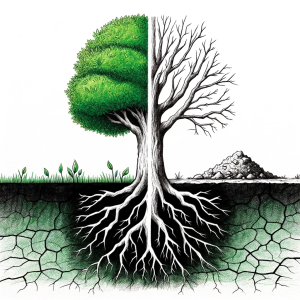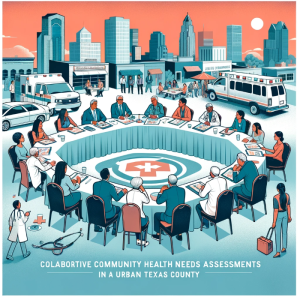
Invisible Chains: How Systemic Racism Impacts Health
When you think of racism, what comes to mind? Many of us picture hateful words, violent acts, or blatant discrimination. However, racism often operates on a much deeper, more insidious level, embedded within the very fabric of our society.
This hidden form of racism, known as systemic or structural racism, is far more pervasive and damaging than the overt acts we’re more familiar with. It’s an invisible chain, affecting the health and well-being of millions in ways we might not even realize.
What Is Systemic Racism?
Systemic racism refers to the policies and practices entrenched in established institutions, which result in the exclusion or promotion of designated groups. It’s not just about individual acts of prejudice but the way these acts are supported and maintained by larger social structures. For example, systemic racism can be seen in laws, written or unwritten policies, and entrenched practices that produce widespread unfair treatment and oppression of people of color. This form of racism is so embedded in systems that it often seems like the natural order of things.
How Does Systemic Racism Affect Health?
Systemic racism affects health through various pathways, creating barriers to opportunities that promote good health and well-being. Let’s explore some of the key ways systemic racism impacts health:
Economic Disadvantage
Economic stability is a fundamental determinant of health. Systemic racism creates significant barriers to economic opportunities for people of color, affecting their ability to secure good jobs, accumulate wealth, and achieve economic stability. Practices like residential segregation and redlining have historically restricted people of color from owning homes and building wealth. Even today, discriminatory lending practices and predatory financial services disproportionately target communities of color, perpetuating cycles of poverty and economic disadvantage. This economic instability leads to chronic stress and limited access to health-promoting resources, ultimately affecting overall health.
Education Inequality
Education plays a vital role in determining one’s health. Systemic racism is evident in the education system through policies that lead to underfunded schools in primarily Black and Latino neighborhoods. This is often a result of public schools heavily relying on local property taxes for funding. Schools in economically disadvantaged areas, which are frequently segregated communities of color, have fewer resources, provide lower quality education, and yield poorer outcomes. This lack of educational opportunities perpetuates cycles of poverty and poor health, ultimately limiting the chances for a better life for future generations.
Environmental Injustice
Environmental injustice refers to the disproportionate exposure of communities of color to environmental hazards. For instance, hazardous waste sites and polluting industries are more likely to be located near these communities, leading to higher rates of diseases like asthma, cancer, and other health problems. A notorious example is the Flint water crisis, where the largely Black population was exposed to lead-contaminated water, with devastating health consequences.
Criminal Justice System
The criminal justice system also plays a significant role in perpetuating health disparities. People of color, particularly Black men, are disproportionately targeted and incarcerated, often for minor offenses. This mass incarceration has far-reaching health implications, not only for those imprisoned but also for their families and communities. Incarceration disrupts family structures, creates economic hardships, and increases exposure to violence and disease within prisons. The psychological and physical health impacts of systemic racism within the criminal justice system are profound and enduring.
How Can We Dismantle Systemic Racism?
Addressing systemic racism requires a multifaceted approach. Here are some key strategies to consider:
Enforce Existing Laws
While enacting new laws is crucial, enforcing existing antidiscrimination laws is equally important. Many discriminatory practices continue because of inadequate enforcement of laws designed to protect against racial discrimination.
Promote Economic Equity
Creating policies that promote economic equity is vital. This includes fair lending practices, affordable housing initiatives, and investments in economically disadvantaged communities to break the cycle of poverty.
Ensure Educational Equity
Investing in education is essential. Policies should aim to provide equal funding for all schools, regardless of local property taxes, and address the specific needs of schools in disadvantaged areas to ensure every child has access to quality education.
Advocate for Environmental Justice
Environmental policies must address the disproportionate impact of pollution and hazardous waste on communities of color. This includes stricter regulations on industries and investments in clean and safe infrastructure.
Reform the Criminal Justice System
Reforming the criminal justice system to eliminate racial biases in policing, sentencing, and incarceration is crucial. This includes implementing fair sentencing laws, investing in rehabilitation rather than punishment, and ensuring equal treatment under the law.
Real-Life Connections
Consider the impact of stress caused by financial instability or exposure to environmental hazards on your health. Now, think about how these challenges are intensified in communities dealing with systemic racism. The ongoing stress of living in poverty, the anxiety of facing unfair treatment, and the lack of resources create an unhealthy environment that significantly affects mental and physical health. Recognizing these connections is crucial in understanding the need to address systemic racism in order to improve public health.
Engage with Us
We’d love to hear your thoughts on this topic. Here are two questions to ponder and discuss in the comments:
- How have you seen systemic racism impact health in your community?
- What steps do you think are most crucial in addressing systemic racism in our society?
Conclusion
Systemic racism is an invisible yet powerful force shaping the health and well-being of millions. By understanding its mechanisms and impacts, we can begin to dismantle these harmful structures and build a more equitable society. This journey requires collective effort, from enforcing laws and promoting economic and educational equity to advocating for environmental justice and reforming the criminal justice system. Let’s work together to break these invisible chains and create a healthier future for everyone.
Empower Your Network – Subscribe and Share!
Unlock key insights with ‘This Week in Public Health.’ Subscribe for free and share to drive change as part of a dedicated community. If you liked this blog, please share it! Your referrals help This Week in Public Health reach new readers.



